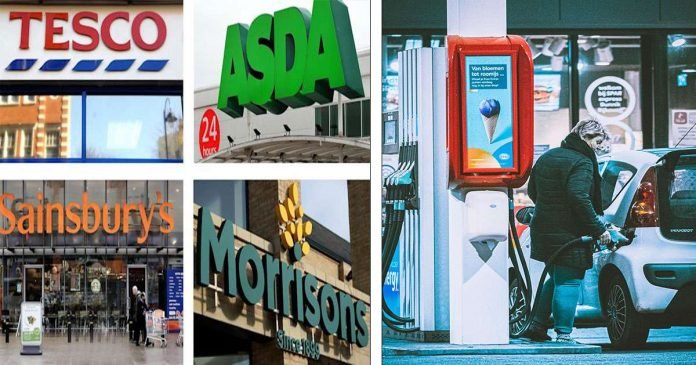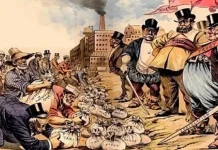RAC issues petrol price warning to drivers filling up at Asda, Sainsbury’s, Morrisons and Tesco
Brent Crude is down 1.05 per cent today, wallowing at $93.92 per barrel, while WTI Crude has slumped a further 1.09 per cent to $88.04 per barrel.
This follows front month prices hitting their lowest levels since February, posting their largest weekly drops since April with Brent Crude tumbling 13.7 per cent and WTI Crude 9.7 per cent.
Prices have now settled below levels prior to Russia’s invasion of Ukraine.
The fall in Oil prices collapsed to pre-February lows, forecourts have not reflected the changes at the pump.
Garages are not cutting fuel prices by as much as they should to match the “significant” price drop on the other end, according to the RAC.
The RAC has said that major retailers are failing to reduce petrol prices for motorists, despite wholesale costs falling. The roadside recovery firm said that drivers are paying 183p per litre on average – but the wholesale cost is back down to 131.75p per litre.
After seeing fuel costs hit their highest ever levels earlier in the summer, the wholesale price of petrol has since fallen by 20p since early June, according to the RAC. The wholesale cost is now back down to levels last seen in early May, when the average price of a litre at the pump for drivers was around 167p.
After increasing prices for motorists throughout June, retailers have only reduced costs by an average of 9p since – this means that drivers could be paying nearly £9 more per tank than they ought to be. The RAC also said that drivers should be paying 182p per litre for diesel, rather than the 192p per litre on average seen at the end of July.
RAC fuel spokesman Simon Williams said: “July has been an unnecessarily tough month for drivers due to the big four supermarkets’ unwillingness to cut their prices to a more reasonable level, reflecting the consistent and significant reductions in the wholesale cost of petrol and diesel. As it was, we saw independent retailers leading the charge, with fairer pump prices appearing all around the country, which eventually forced the supermarkets to finally implement a more substantial cut late last Friday afternoon.
“What ought to have happened is that the biggest retailers cut their prices more significantly on a daily basis, given the wholesale price of petrol has fallen steadily over the last eight weeks,” Mr Williams added. The “big four” supermarkets of Asda, Morrisons, Sainsbury’s and Tesco have faced criticism in recent weeks along with other suppliers for failing to reduce their pump prices.
With the cost of living continuing to rise, the RAC has advised drivers to shop around when it comes to getting their tank filled, as the major supermarkets may no longer be the cheapest places to get fuel. Mr Williams told motorists that it is now “highly likely you’ll find an independent retailer which is doing the right thing and fairly reflecting their lower wholesale costs by charging a lower price”.
Mr Williams explained how this was usually reflected in the speed at which they pass on rising costs on their forecourts when wholesale prices increase.
He added: “As the supermarkets account for so much of all the fuel sold across the country and they haven’t lowered their prices as much as they should have, it means average UK prices have not come down in line with the significant drop in wholesale fuel.”
The difference in cost between retail and wholesale prices is the largest since RAC records began in 2013, excluding VAT.
Current gaps are bigger than they were at the start of the pandemic, during lockdowns, and when the price of oil plummeted to around £10.50 per barrel.
Oil rose to almost £82 per barrel in recent months.
But the effects of the war has worsened the situation.
Sanctions on Russia, one of the world’s largest exporters of oil, has increased demand for oil from other producers, causing hikes in prices.
Despite the UK importing just 6 per cent of its crude oil from Russia, it is still impacted when costs increase worldwide.
.
Support Independent Journalism Today
Our unwavering dedication is to provide you with unbiased news, diverse perspectives, and insightful opinions. We're on a mission to ensure that those in positions of power are held accountable for their actions, but we can't do it alone. Labour Heartlands is primarily funded by me, Paul Knaggs, and by the generous contributions of readers like you. Your donations keep us going and help us uphold the principles of independent journalism. Join us in our quest for truth, transparency, and accountability – donate today and be a part of our mission!
Like everyone else, we're facing challenges, and we need your help to stay online and continue providing crucial journalism. Every contribution, no matter how small, goes a long way in helping us thrive. By becoming one of our donors, you become a vital part of our mission to uncover the truth and uphold the values of democracy.
While we maintain our independence from political affiliations, we stand united against corruption, injustice, and the erosion of free speech, truth, and democracy. We believe in the power of accurate information in a democracy, and we consider facts non-negotiable.
Your support, no matter the amount, can make a significant impact. Together, we can make a difference and continue our journey toward a more informed and just society.
Thank you for supporting Labour Heartlands












